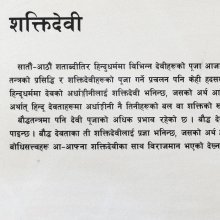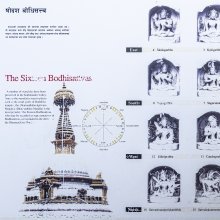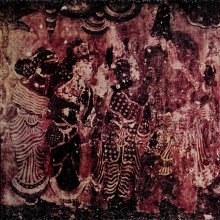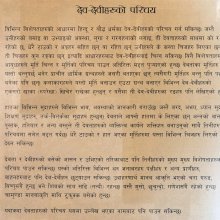Shatha, Śaṭha, Satha, Saṭha, Śaṭhā: 26 definitions
Introduction:
Shatha means something in Hinduism, Sanskrit, Buddhism, Pali, Marathi, Hindi, biology. If you want to know the exact meaning, history, etymology or English translation of this term then check out the descriptions on this page. Add your comment or reference to a book if you want to contribute to this summary article.
The Sanskrit terms Śaṭha and Śaṭhā can be transliterated into English as Satha or Shatha, using the IAST transliteration scheme (?).
Images (photo gallery)
In Hinduism
Natyashastra (theatrics and dramaturgy)
Source: Wisdom Library: Nāṭya-śāstra1) Śaṭha (शठ) is the Sanskrit name of one of Bharata’s sons, mentioned in the Nāṭyaśāstra 1.26-33. After Brahmā created the Nāṭyaveda (nāṭyaśāstra), he ordered Bharata to teach the science to his (one hundred) sons. Bharata thus learned the Nāṭyaveda from Brahmā, and then made his sons study and learn its proper application. After their study, Bharata assigned his sons (eg., Śaṭha) various roles suitable to them.
2) Śaṭha (शठ, “deceitful”) refers to a term to be used by women who is angered addressing their beloved, according to the Nāṭyaśāstra chapter 24. Accordingly, “he who for his own purpose speaks sweet words but does not put them into practice is called ‘deceitful’ (śaṭha)”.
Source: Shodhganga: The significance of the mūla-beras (natya)Śaṭha (शठ) refers to a “hero who is cunning and lives openly with any number of women and does not keep any secret about himself” and represents one of the four kinds of “heroes” (nāyaka) in a dramatic representation, according to the Abhinaya-sara-samputa, as used within the classical tradition of Indian dance and performance, also known as Bharatanatyam.—In the depiction of any mood or sentiment, a dance performance or a dramatic representation takes the medium of the hero (nāyaka) and the heroine (nāyikas). The heroes are again classified on the basis of their erotic sentiments into four types [viz., Śaṭha].

Natyashastra (नाट्यशास्त्र, nāṭyaśāstra) refers to both the ancient Indian tradition (shastra) of performing arts, (natya—theatrics, drama, dance, music), as well as the name of a Sanskrit work dealing with these subjects. It also teaches the rules for composing Dramatic plays (nataka), construction and performance of Theater, and Poetic works (kavya).
Purana and Itihasa (epic history)
Source: archive.org: Puranic EncyclopediaŚaṭha (शठ).—An asura, son of Kaśyapaprajāpati by his wife Danu. (Ādi Parva, Chapter 65, Verse 29).
Source: archive.org: Shiva Purana - English TranslationŚaṭha (शठ) refers to one who is “roguish” and is used by Nandīśvara to address Dakṣa after the latter cursed Śiva, according to the Śivapurāṇa 2.2.26. Accordingly as Brahmā narrated to Nārada:—“[...] after duly saluting Śiva along with the devas, Nandin, the attendant of Śiva who had heard the words of Dakṣa, was very furious and rolled his eyes. With an intention to curse him, he immediately spoke to Dakṣa. Nandīśvara said:—‘[...] O foolish Dakṣa, of roguish (śaṭha) and wicked intention, how is it that you have expelled my lord Śiva from sacrifice?’”.
Source: Cologne Digital Sanskrit Dictionaries: The Purana Index1) Śaṭha (शठ).—Went with Kṛṣṇa to Upaplāvya to see the Pāṇḍavas;1 a son of Vasudeva and Rohiṇī; father of several sons.2
- 1) Bhāgavata-purāṇa X. 78. [95 (V) 3].
- 2) Brahmāṇḍa-purāṇa III. 71. 164, 169-70; Viṣṇu-purāṇa IV. 15 19.
2) Śaṭhā (शठा).—Ekārṣeyas.*
- * Matsya-purāṇa 200. 3.
Śaṭha (शठ) is a name mentioned in the Mahābhārata (cf. I.59.28, I.65) and represents one of the many proper names used for people and places. Note: The Mahābhārata (mentioning Śaṭha) is a Sanskrit epic poem consisting of 100,000 ślokas (metrical verses) and is over 2000 years old.

The Purana (पुराण, purāṇas) refers to Sanskrit literature preserving ancient India’s vast cultural history, including historical legends, religious ceremonies, various arts and sciences. The eighteen mahapuranas total over 400,000 shlokas (metrical couplets) and date to at least several centuries BCE.
Shaktism (Shakta philosophy)
Source: Wisdom Library: ŚāktismŚaṭha (शठ, “evil”) refers to one of the sixty defects of mantras, according to the 11th century Kulārṇava-tantra: an important scripture of the Kaula school of Śāktism traditionally stated to have consisted of 125.000 Sanskrit verses.—Accordingly, as Īśvara says to Śrī Devī: “For those who do japa without knowing these defects [e.g., śaṭha—evil], there is no realization even with millions and billions of japa. [...] Oh My Beloved! there are ten processes for eradicating defects in Mantras as described. [...]”.
Source: Google Books: ManthanabhairavatantramŚaṭha (शठ) refers to “one who cheats”, according to the Manthānabhairavatantra, a vast sprawling work that belongs to a corpus of Tantric texts concerned with the worship of the goddess Kubjikā.—Accordingly, while describing the signs of one who is not a Siddha: “He is excessively tall, bald, deformed, short, dwarfish, his nose is ugly or he has black teeth and is wrathful . Some of his limbs are missing and is deceitful, cripple and deformed, foolish, inauspicious, envious, deluded, badly behaved, and violent; without any teacher, he is devoid of the rites, he maligns the Krama without cause, he is not devoted to the Siddhas, he (always) suffers and is without wisdom. He is (always) ill and one should know that he is (always) attached (to worldly objects) and has no scripture. He has no energy and is dull and lazy. Ugly, he lives by cheating [i.e., śaṭha-vītaka] and, cruel, he is deluded, and devoid of (any) sense of reality. Such is the characteristic of one who is not accomplished (asiddha) in a past life”.

Shakta (शाक्त, śākta) or Shaktism (śāktism) represents a tradition of Hinduism where the Goddess (Devi) is revered and worshipped. Shakta literature includes a range of scriptures, including various Agamas and Tantras, although its roots may be traced back to the Vedas.
Jyotisha (astronomy and astrology)
Source: Wisdom Library: Brihat Samhita by VarahamihiraŚaṭha (शठ) refers to “(one who is) deceitful”, according to the Bṛhatsaṃhitā (chapter 15) (“On the nakṣatras—‘asterisms’”), an encyclopedic Sanskrit work written by Varāhamihira mainly focusing on the science of ancient Indian astronomy astronomy (Jyotiṣa).—Accordingly, “Those who are born on the lunar day of Pūrvabhādrapada will be thieves, shepherds, torturers; wicked, mean and deceitful (śaṭha); will possess no virtues; neglect religious rites and will be successful in fight. Those who are born on the lunar day of Uttarabhādrapada will be Brāhmins, performers of sacrificial rights; will be generous, devout, rich and observant of the rules of the holy orders; will be heretics, rulers, dealers in rice”.

Jyotisha (ज्योतिष, jyotiṣa or jyotish) refers to ‘astronomy’ or “Vedic astrology” and represents the fifth of the six Vedangas (additional sciences to be studied along with the Vedas). Jyotisha concerns itself with the study and prediction of the movements of celestial bodies, in order to calculate the auspicious time for rituals and ceremonies.
Biology (plants and animals)
Source: Wisdom Library: Local Names of Plants and DrugsSatha in the Hindi language is the name of a plant identified with Boerhavia diffusa L. from the Nyctaginaceae (Bougainvillea) family having the following synonyms: Boerhavia paniculata, Boerhavia acutifolia. For the possible medicinal usage of satha, you can check this page for potential sources and references, although be aware that any some or none of the side-effects may not be mentioned here, wether they be harmful or beneficial to health.
Source: Google Books: CRC World Dictionary (Regional names)Satha in India is the name of a plant defined with Boerhavia diffusa in various botanical sources. This page contains potential references in Ayurveda, modern medicine, and other folk traditions or local practices It has the synonym Boerhavia diffusa var. mutabilis (R.Br.) Heimerl (among others).
Example references for further research on medicinal uses or toxicity (see latin names for full list):
· Flora Indica, or ‘Descriptions of Indian Plants’ (1832)
· Species Plantarum (1753)
· Species Plantarum. (1797)
· Flora Indica, or ‘Descriptions of Indian Plants’ (1820)
· Anales de Ciencias Naturales (1801)
· Phytographia (1794)
If you are looking for specific details regarding Satha, for example extract dosage, diet and recipes, health benefits, side effects, pregnancy safety, chemical composition, have a look at these references.

This sections includes definitions from the five kingdoms of living things: Animals, Plants, Fungi, Protists and Monera. It will include both the official binomial nomenclature (scientific names usually in Latin) as well as regional spellings and variants.
Languages of India and abroad
Pali-English dictionary
Source: BuddhaSasana: Concise Pali-English Dictionarysaṭha : (adj.) crafty; fraudulent. (m.), a cheat.
Source: Sutta: The Pali Text Society's Pali-English DictionarySaṭha, (adj.) (cp. Sk. śaṭha) crafty, treacherous, fraudulent D. II, 258; III, 246; M. I, 32, 153; S. IV, 299; A. II, 41; III, 35; V, 157; Dh. 252; Vin. II, 89; Nd1 395; Miln. 250; Dāvs II. 88; DhA. III, 375; Dhtp 100 (=keṭave).—f. saṭhī Pv. II, 34. See also kerāṭika, samaya°, sāṭheyya. (Page 671)

Pali is the language of the Tipiṭaka, which is the sacred canon of Theravāda Buddhism and contains much of the Buddha’s speech. Closeley related to Sanskrit, both languages are used interchangeably between religions.
Marathi-English dictionary
Source: DDSA: The Molesworth Marathi and English Dictionaryśaṭha (शठ).—a (S) Roguish, knavish, crafty and dishonest. 2 Applied freely in the general sense of Vile, hateful, execrable, abominable; also in the sense of Miserly, niggardly, penurious, churlish.
--- OR ---
saṭha (सठ).—f (ṣaṣṭhī S) The sixth day of either half-month. 2 A form of Durga. 3 See saṭavāī.
--- OR ---
sāṭha (साठ).—m (Commonly sāṭa) A frame-flooring &c.
--- OR ---
sāṭha (साठ).—a (ṣaṣṭi S) Sixty.
--- OR ---
sāṭhā (साठा) [or ठ्या, ṭhyā].—m A frame (as of a picture, mirror, whipsaw &c.): also the frame or box of a gāḍī or carriage, of a myānā or palanquin &c.: also the frame or skeleton of a large machine or of a building, of an animal's body (living or dead), of an umbrella &c.
--- OR ---
sātha (साथ).—f (sārtha S through H) Company, association, society, fellowship: also a companion, fellow, partner, mate. Pr. bhāta sōḍāvā sātha sōḍūṃ nayē.
Source: DDSA: The Aryabhusan school dictionary, Marathi-Englishśaṭha (शठ).—a Roguish. Vile, hateful.
--- OR ---
sāṭha (साठ).—a Sixty.
--- OR ---
sāṭhā (साठा).—m A frame.
--- OR ---
sātha (साथ).—f Company, fellowship; a partner.
Marathi is an Indo-European language having over 70 million native speakers people in (predominantly) Maharashtra India. Marathi, like many other Indo-Aryan languages, evolved from early forms of Prakrit, which itself is a subset of Sanskrit, one of the most ancient languages of the world.
Sanskrit dictionary
Source: DDSA: The practical Sanskrit-English dictionaryŚaṭha (शठ).—a. [śaṭh-ac]
1) Crafty, deceitful, fraudulent. dishonest, perfidious.
2) Wicked, depraved.
-ṭhaḥ 1 A rogue, cheat, knave, swindler; Manusmṛti 4.3; Bhagavadgītā (Bombay) 18.28.
2) A false or deceitful lover (who pretends to love one woman while his heart is fixed on another); ध्रुवमस्मि शठः शुचि- स्मिते विदितः कैतववत्सलस्तव (dhruvamasmi śaṭhaḥ śuci- smite viditaḥ kaitavavatsalastava) R.8.49;19.31; शठ इति मयि तावदस्तु ते परिचयवत्यवधीरणा प्रिये (śaṭha iti mayi tāvadastu te paricayavatyavadhīraṇā priye) M.3.19; (the S. D. thus defines a śaṭha:-śaṭho'yamekatra baddhabhāvo yaḥ | darśitabahiranurāgo vipriyamanyatra gūḍhamācarati || 74).
3) A fool, blockhead.
4) A mediator, arbitrator.
5) The Dhattūra plant.
6) An idler, a lazy fellow.
-ṭham 1 Iron.
2) Saffron.
Source: Cologne Digital Sanskrit Dictionaries: Edgerton Buddhist Hybrid Sanskrit DictionaryŚaṭha (शठ).—app. as abstr. = Sanskrit śāṭhya (otherwise only rogue, or adj. tricky), trickiness: śaṭha-nikṛti-paiśunyāni tu manuṣya-gahanāni Mahāvastu i.91.17 (verse, metrical(ly) defective).
--- OR ---
Śāṭhā (शाठा).—(so Index and Mironov; text Śāthā), name of a country or part of the world: Mahāvyutpatti 3055 (= Tibetan gyo ldan, crafty).
Source: Cologne Digital Sanskrit Dictionaries: Shabda-Sagara Sanskrit-English DictionaryŚaṭha (शठ).—mfn.
(-ṭhaḥ-ṭhā-ṭhaṃ) Wicked, depraved, perverse, dishonest. m.
(-ṭhaḥ) 1. An umpire, a mediator, an arbitrator. 2. A rogne, a knave. 3. A blockhead, a fool. 4. An idler. 5. A false husband or lover, one who pretends affection to one female whilst his heart is fixed on another. 6. Thorn apple, (Dhatura metel.) n.
(-ṭhaṃ) 1. A sort of root, commonly Tagara. 2. Saffron. 3. Iron. E. śaṭh to be wicked, aff. ac .
Source: Cologne Digital Sanskrit Dictionaries: Benfey Sanskrit-English DictionaryŚaṭha (शठ).—probably akin to śatru, cf. śatera, perhaps a form of *śatra, I. adj. Wicked, dishonest, perfidions, [Lassen, Anthologia Sanskritica.] 31, 17; [Hitopadeśa] ii. [distich] 115. Ii. m. 1. A rogue, a knave, [Mānavadharmaśāstra] 7, 123. 2. A false husband or lover, [Lassen, Anthologia Sanskritica.] 45, 5; [Śṛṅgāratilaks] 10; [Mālavikāgnimitra, (ed. Tullberg.)] [distich] 55 (read śaṭha). 3. An idler. 4. A blockhead. 5. A mediator.
Source: Cologne Digital Sanskrit Dictionaries: Cappeller Sanskrit-English DictionaryŚaṭha (शठ).—[adjective] false, wicked; [abstract] tva [neuter]
Source: Cologne Digital Sanskrit Dictionaries: Monier-Williams Sanskrit-English Dictionary1) Śaṭha (शठ):—[from śaṭh] mf(ā)n. false, deceitful, fraudulent, malignant, wicked, [Āpastamba; Manu-smṛti; Mahābhārata] etc.
2) [v.s. ...] m. a cheat, rogue ([especially] a false husband or lover, who pretends affection for one female while his heart is fixed on another; one of the four classes into which husbands are divided), [Horace H. Wilson]
3) [v.s. ...] a, fool, blockhead, [ib.]
4) [v.s. ...] an idler, [ib.]
5) [v.s. ...] a mediator, umpire, [cf. Lexicographers, esp. such as amarasiṃha, halāyudha, hemacandra, etc.]
6) [v.s. ...] the thorn-apple, [cf. Lexicographers, esp. such as amarasiṃha, halāyudha, hemacandra, etc.]
7) [v.s. ...] white mustard seed, [cf. Lexicographers, esp. such as amarasiṃha, halāyudha, hemacandra, etc.]
8) [v.s. ...] Name of an Asura, [Mahābhārata]
9) [v.s. ...] of a son of Vasu-deva, [Harivaṃśa] ([varia lectio] gada and suta)
10) [from śaṭh] n. saffron, [cf. Lexicographers, esp. such as amarasiṃha, halāyudha, hemacandra, etc.]
11) [v.s. ...] Tabernaemontana Coronaria, [cf. Lexicographers, esp. such as amarasiṃha, halāyudha, hemacandra, etc.]
12) [v.s. ...] steel, [cf. Lexicographers, esp. such as amarasiṃha, halāyudha, hemacandra, etc.]
13) [v.s. ...] tin, [cf. Lexicographers, esp. such as amarasiṃha, halāyudha, hemacandra, etc.]
14) Śāṭha (शाठ):—m. ([probably] [patronymic] [from] śaṭha) See kaṭha-ś.
Source: Cologne Digital Sanskrit Dictionaries: Yates Sanskrit-English Dictionary1) Śaṭha (शठ):—[(ṭhaḥ-ṭhā-ṭhaṃ) a.] Wicked. m. An umpire; a rogue; a fool; thorn apple. n. A sort of root; saffron; iron.
2) Saṭha (सठ):—(ka) sāṭhayati 10. a. To finish or the contrary; to go.
Source: DDSA: Paia-sadda-mahannavo; a comprehensive Prakrit Hindi dictionary (S)Śaṭha (शठ) in the Sanskrit language is related to the Prakrit words: Saṃṭha, Saḍha.
[Sanskrit to German]
Sanskrit, also spelled संस्कृतम् (saṃskṛtam), is an ancient language of India commonly seen as the grandmother of the Indo-European language family (even English!). Closely allied with Prakrit and Pali, Sanskrit is more exhaustive in both grammar and terms and has the most extensive collection of literature in the world, greatly surpassing its sister-languages Greek and Latin.
Hindi dictionary
Source: DDSA: A practical Hindi-English dictionary1) Śaṭha (शठ) [Also spelled shath]:—(a) wicked, knave, crafty, cunning; ~[tā] wickedness, knavery, craftiness, cunningness; [śaṭhe śāṭhyaṃ samācareta] deal with the devil in his own way, tit for tat.
2) Sāṭha (साठ) [Also spelled sath]:—(a) sixty; (nm) the number sixty.
3) Sāṭhā (साठा):—(a) of sixty years of age; —[so pāṭhā] youth sets in as one reaches sixty.
4) Sātha (साथ) [Also spelled sath]:—(adv) with, together, along with, withal; by; (nm) company, association; support; -[sātha] together; •[rahanā] to associate with, to live in the company of; —[kā khelā] chum; —[khonā] to be deprived of the company of; —[ghasīṭanā] to oblige to accompany; —[chūṭanā] to be cut off; —[denā] to make common cause with; to keep company with; to stand by; —[nibāhanā] to continue to be a loyal companion; to steadfastly stand by; —[rahanā] to live together; —[laga lenā] to thrust oneself on; to join a reluctant person; —[lagā rahanā] to be ever on somebody’s heels, to constantly hover around; —[lekara ḍūbanā] to involve someone in a sure tragedy; —[sonā] to share bed with; —[hī] besides, apart from this; along with this; —[hī sātha] together; —[honā] to be one with; to stand by, to participate.
...
Kannada-English dictionary
Source: Alar: Kannada-English corpusŚaṭha (ಶಠ):—
1) [adjective] deceitful; fraudulent.
2) [adjective] malignant; wicked.
--- OR ---
Śaṭha (ಶಠ):—
1) [noun] a man who habitually cheats others; a cheat.
2) [noun] a rascal; a scoundrel; a rogue.
3) [noun] a cheating or being cheated.
4) [noun] a hero, in a play, who pretends affection for one woman while his heart is fixed on another.
--- OR ---
Sāṭhā (ಸಾಠಾ):—[noun] an accumulating or being accumulated; accumulation.
Kannada is a Dravidian language (as opposed to the Indo-European language family) mainly spoken in the southwestern region of India.
See also (Relevant definitions)
Starts with (+18): Satakam, Sathata, Shatam, Shatamakan, Shatankam, Shathaavari, Shathab, Shathabuddhi, Shathabuddhita, Shathadhi, Shathaga, Shathagamika, Shathagopa, Shathai, Shathaka, Shathakopa, Shathakopa acarya, Shathakopadasa, Shathakopasahasranaman, Shathakopavishaya.
Ends with: Akshatha, Asatha, Astamitashatha, Dantasatha, Devadattashatha, Dushshatha, Kathashatha, Kramashatha, Mahashatha, Nishatha, Parisatha, Prashatha, Sushatha, Tveshatha, Uposatha, Vakshatha, Vishatha.
Full-text (+160): Asatha, Sathata, Santha, Dantasatha, Shathayanya, Shadha, Parisatha, Nishatha, Kathashatha, Kathashathin, Phanasapoli, Shathya, Shathodarka, Potaca, Kramashatha, Shatah, Ajivani, Shathaga, Shathaprakriti, Shathin.
Relevant text
Search found 36 books and stories containing Shatha, Śaṭha, Satha, Saṭha, Śaṭhā, Sāṭha, Sāṭhā, Sātha, Śāṭhā, Śāṭha; (plurals include: Shathas, Śaṭhas, Sathas, Saṭhas, Śaṭhās, Sāṭhas, Sāṭhās, Sāthas, Śāṭhās, Śāṭhas). You can also click to the full overview containing English textual excerpts. Below are direct links for the most relevant articles:
Bhajana-Rahasya (by Srila Bhaktivinoda Thakura Mahasaya)
Text 1 < [Chapter 8 - Aṣṭama-yāma-sādhana (Rātri-līlā–prema-bhajana sambhoga)]
Chaitanya Bhagavata (by Bhumipati Dāsa)
Verse 3.1.73 < [Chapter 1 - Meeting Again at the House of Śrī Advaita Ācārya]
Verse 2.23.28 < [Chapter 23 - Wandering about Navadvīpa On the Day the Lord Delivered the Kazi]
Verse 1.10.7 < [Chapter 10 - Marriage with Śrī Lakṣmīpriyā]
Tattvartha Sutra (with commentary) (by Vijay K. Jain)
Verse 5.35 - Atoms of the the same class (sadṛśa) < [Chapter 5 - The Non-living Substances]
Verse 2.41 - Beginningless association with the soul < [Chapter 2 - Category of the Living]
Verse 9.17 - Simultaneous afflictions in a single soul < [Chapter 9 - Stoppage and Shedding of Karmas]
Yogadrstisamuccaya of Haribhadra Suri (Study) (by Riddhi J. Shah)
Chapter 2.3 - Date of Haribhadrasūri < [Chapter 2 - Life, Date and Works of Ācārya Haribhadrasūri]
Chapter 5.3 - A Rejoicer of worldly existence (Bhavābhinandī Jīva) < [Chapter 5 - A Line of Demarcation between the first four and last four Yogadṛṣṭis]
Manusmriti with the Commentary of Medhatithi (by Ganganatha Jha)
Verse 7.123 < [Section X - Internal Administration]
Verse 4.196 < [Section XIV - Other Duties]
Satirical works of Kshemendra (study) (by Arpana Devi)
1.7. Virodhābhāsa (contradiction) < [Chapter 4 - Literary study of the Three Satirical Works]





